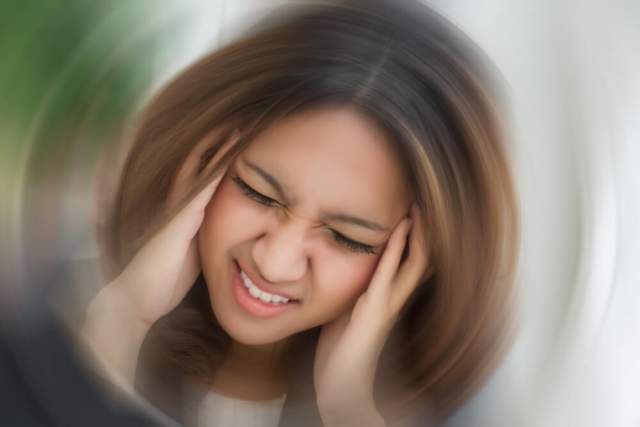Vertigo & dizziness have long been used together to signify a range of symptoms. A feeling of lightheaded, woozy, faint, & weak in the arms or legs. Although they are used together quite often, they are not the same thing. In fact, they are very different from each other.
Vertigo signifies a feeling of the surroundings spinning or moving uncontrollably, a sort of spinning sensation. One can also call it a false perception of motion even when there is no external source of motion present. Vertigo & dizziness are often borne out of different causes; this makes it even more important to accurately determine the difference between dizziness and vertigo.
Since both vertigo treatment & dizziness treatment depend on the exact causes of the conditions, your doctors have the preliminary task of figuring out which one of the two you’re actually experiencing.
In this blog, we’ll have a clear look at understanding the difference between dizziness and vertigo. We’ll explain their individual symptoms & signs, & also give you advice on when to visit a doctor for either of these conditions.
Difference between dizziness and vertigo:
Dizziness generally involves a lightheaded feeling or a sensation where you feel almost as if you’re fainting. Patients may also describe it as feeling woozy, wobbly, & difficulty in maintaining their balance.
However, vertigo generally involves spinning sensations or perception of movement even when there is none present. Patients generally feel as if they or their surroundings are moving around or spinning uncontrollably. They feel as if they are on a rocking boat or chair, being pulled forward & backwards through no agency of their own.
It’s also common for vertigo patients to feel nauseous, motion sick, get migraine headaches, photosensitivity & sound sensitivity, as well as vomit & retch. Patients might also feel as if they’re tipping towards one direction & are unable to maintain a straight gait while walking or running, etc.
Perhaps one of the biggest clues to determine the difference between dizziness & vertigo, is that vertigo patients often say that their symptoms are triggered by a sudden change in the position of the head.
This is especially pronounced in patients experiencing BPPV(Benign Paroxysmal Positional Vertigo), a type of peripheral vertigo.
Dizziness causes, dizziness exercises, & dizziness treatment:
Dizziness has a variety of causes. Some of these may be due to some underlying illnesses or conditions. Some others may be due to certain environmental factors or an acute cause like dehydration, lack of sleep, fever, etc. Sometimes, a genetic cause like an autoimmune disorder or brain tumor, sickle cell disease, certain cancers, & anemia can also cause dizziness.
However, most causes of dizziness are usually benign & nothing to worry about. They also often dissipate on their own in some time, taking the dizziness symptoms with them. In other cases, they may linger well beyond what can be called an acute phase, & may interfere with the body’s balance-maintaining mechanisms.
Some of the most common & well-known dizziness causes include:
- Dehydration
- Exhaustion due to heat or heatstroke
- Low blood sugar, also known as hypoglycemia
- Anemia due to low red blood cell count or iron deficiency. Both acquired & genetic cases are included in this differential diagnosis.
- Low blood pressure, also known as hypotension
- Anxiety attacks, also known as panic attacks. Dizziness is often a very common sign of anxiety attacks & both long-term or short-term anxiety.
- Motion sickness. Getting into a car or riding a merry-go-round, rollercoaster, bus, or ship can all bring about motion sickness, which may cause dizziness in the affected person.
- Any kind of head injuries that are severe enough to disturb the momentum or the balance of the person even for a short moment.
- Side effects of certain medications. Medicines like antihistamines, anti-anxiety tablets, & antidepressants often cause drowsiness and dizziness as a side effect.
- Excessive alcohol consumption. It’s important to note here that every person’s alcohol tolerance limit is different, & hence what is excessive to one person might be extremely mild to moderate levels of drinking in someone else.
- Carbon monoxide poisoning
- Acute infections like the cold, flu, or any other illness can also sometimes cause dizziness as the body uses up excessive energy to fight off the invaders. This makes the patient feel weak &/or dizzy.
Dizziness treatment:
Dizziness treatment often depends on the exact dizziness cause. For example, if low iron in your blood is causing dizziness, your doctor may suggest some over-the-counter iron supplements &/or medications that help increase the red blood cell count in your bloodstream.
In some cases, a blood transfusion also becomes necessary to ensure the person has enough healthy red blood cells to transport nutrients in the body. For other causes like infections, your doctor may prescribe you an antibiotic or rest & plenty of fluids. This is done to counter the illness and help your body become stronger.
Similarly, other causes can be treated with the help of certain dizziness exercises & other dizziness treatment methods. In some rare cases, your dizziness cause might be something serious & potentially life-threatening. In such cases, your doctor will conduct more tests to be sure & evaluate your condition carefully to suggest the next steps for appropriate treatment.
Vertigo symptoms:
Vertigo symptoms involve a range of feelings & sensations. Not every vertigo patient necessarily experiences all of these, but some do. These common vertigo symptoms include:
- A spinning sensation or a feeling of your surroundings spinning around or moving uncontrollably,
- Rapid, abnormal, jerky eye movements, also known as nystagmus. Nystagmus is often solely present in vertigo patients, & forms an important distinguishing factor for doctors to establish the difference between dizziness and vertigo diagnosis in a patient.
- Tilting, swaying, or moving towards one side of the body, usually towards the affected side.
- Migraine headaches with or without an aura. Often, photosensitivity & light sensitivity also occurs.
- Vomiting
- Nausea
- Motion sickness
- Rapid heartbeat(tachycardia)
- Chills & excessive sweating
- tinnitus(a ringing, buzzing, or whooshing sound in the ears)
- Hearing loss(may or may not be present)
- earache(may or may not be present)
- A feeling of pressure inside the ears(may or may not be present)
Vertigo is usually caused by inner ear issues. Ear infections & other acute infectious illnesses like the cold, flu, & others can all cause vertigo. However, the central type of vertigo is usually caused by a brain injury, a spinal cord injury, a brainstem injury/abnormality, or certain central nervous system disorders like Multiple Sclerosis, etc. TIA(Transient Ischemic Attack), also known as a mini-stroke, can also cause vertigo, so can a brain stroke or some brain tumors.
In some rare cases, a certain type of benign tumor called acoustic neuroma, which grows on the vestibular nerve of the inner ear, can also cause vertigo. This usually happens when the tumor becomes big enough to start pressing on the vestibular nerve, causing problems with its functioning.
Other common causes of vertigo include:
- Benign paroxysmal positional vertigo(BPPV). It is the most common cause of vertigo & affects about 80% of all vertigo patients. It is also easily treatable with the help of vertigo exercises like the Epley Maneuver, the Brandt-Daroff exercises, & more.
- Vestibular Neuritis. It is an inner ear infection that affects the vestibular nerve & causes symptoms like dizziness, spinning sensations, nausea, motion sickness, & vomiting. Bacteria or viruses can cause it, hence treatment generally involves antibiotics &/or plenty of fluids & rest.
- Labyrinthitis: It is also an inner ear infection that is caused by bacteria or viruses that cause inflammation & swelling inside the labyrinth of the inner ear. This leads to vertigo symptoms like dizziness, nausea, motion sickness, headaches, earaches, & occasional hearing loss.
- Meniere’s Disease. It is an inner ear disorder that is caused by an excessive accumulation of fluid inside the ears. This extra fluid causes symptoms like ringing inside the ears(Tinnitus), a feeling of pressure in the ears, headache, nausea, motion sickness, hearing loss in the affected ear, vertigo, dizziness, & vomiting.
Other causes of Vertigo include:
- Any kind of head injury
- Any tumors on the brain &/or the nerves responsible for carrying balance-related signals from the inner ear to the brain.
- Any infections or illnesses in the body
- Ear surgery
- Middle ear infections
- Neck injury
- Neck surgery
Vertigo treatment:
Vertigo treatment usually depends on the exact vertigo cause. Depending on your exact underlying illnesses & medical history, your doctor will prescribe you the appropriate vertigo treatment methods.
In usual cases, your vertigo treatment may include:
- Vertigo exercises like the Epley Maneuver, also known as the Canalith Repositioning maneuver, the Brandt-Daroff exercises, & the Semont Maneuver. These exercises help reposition the dislodged calcium crystals back into their original position inside the middle ear.
- Vertigo medicines like the Stemetil tablet, Meclizine tablet, Vertin tablet, & more. These help treat dizziness, nausea, motion sickness, & other symptoms that arise in vertigo patients.
- Home remedies like Ginkgo Biloba supplements, Vitamin D supplements, Vitamin C supplements, & more to promote good health & overall immunity boost.


